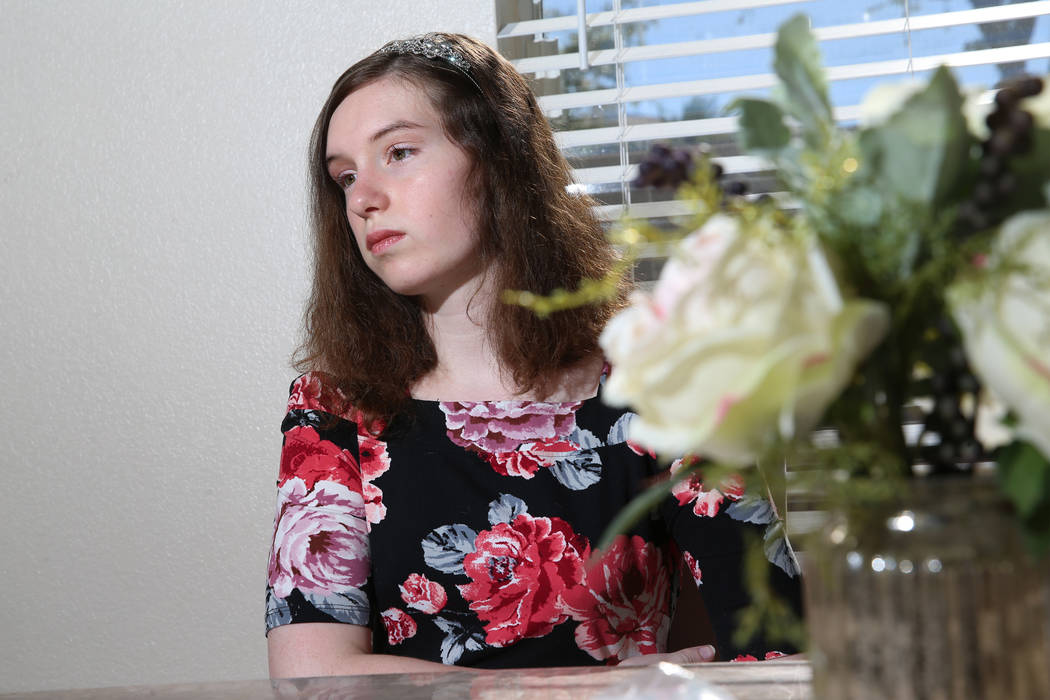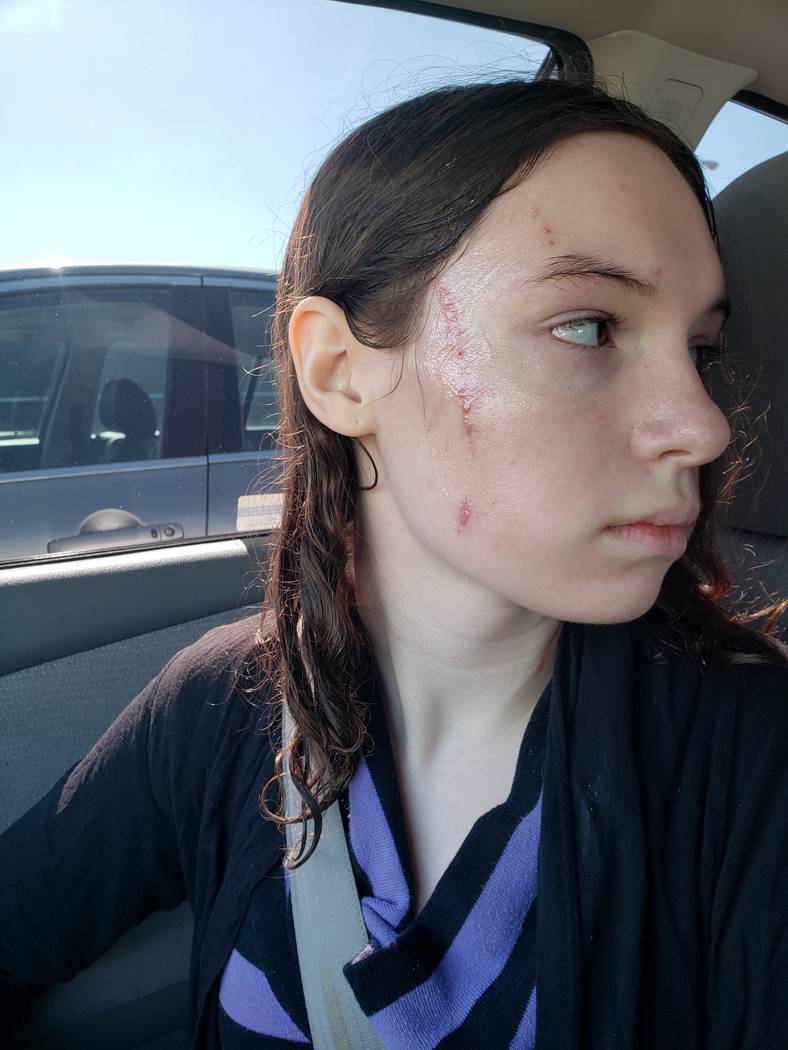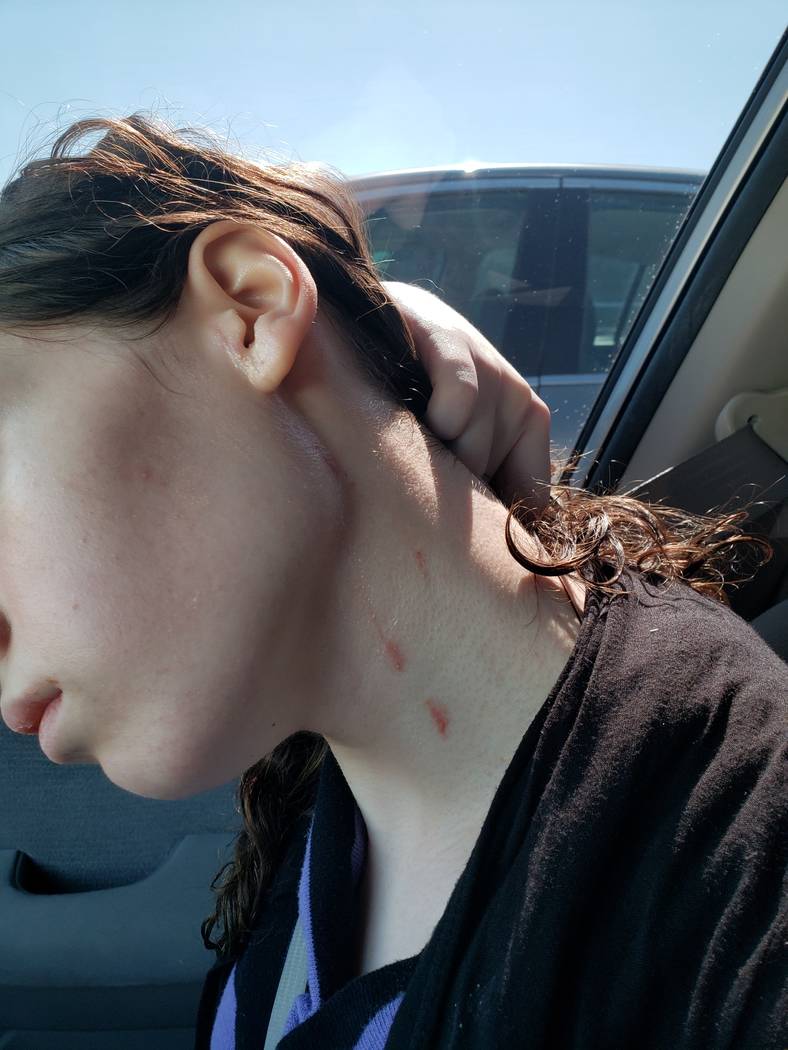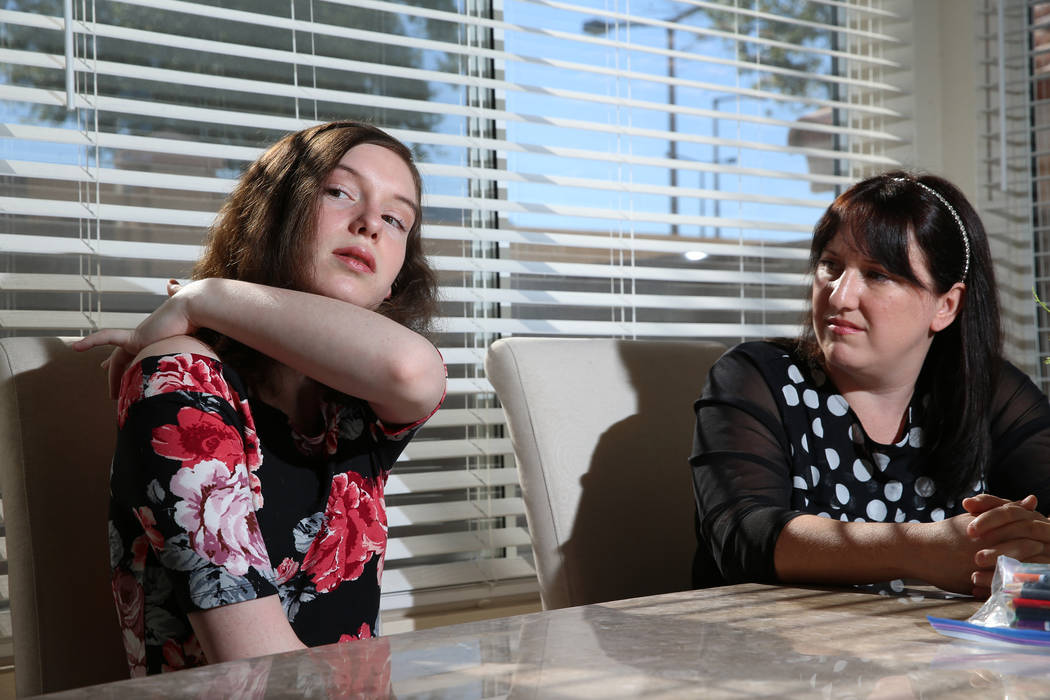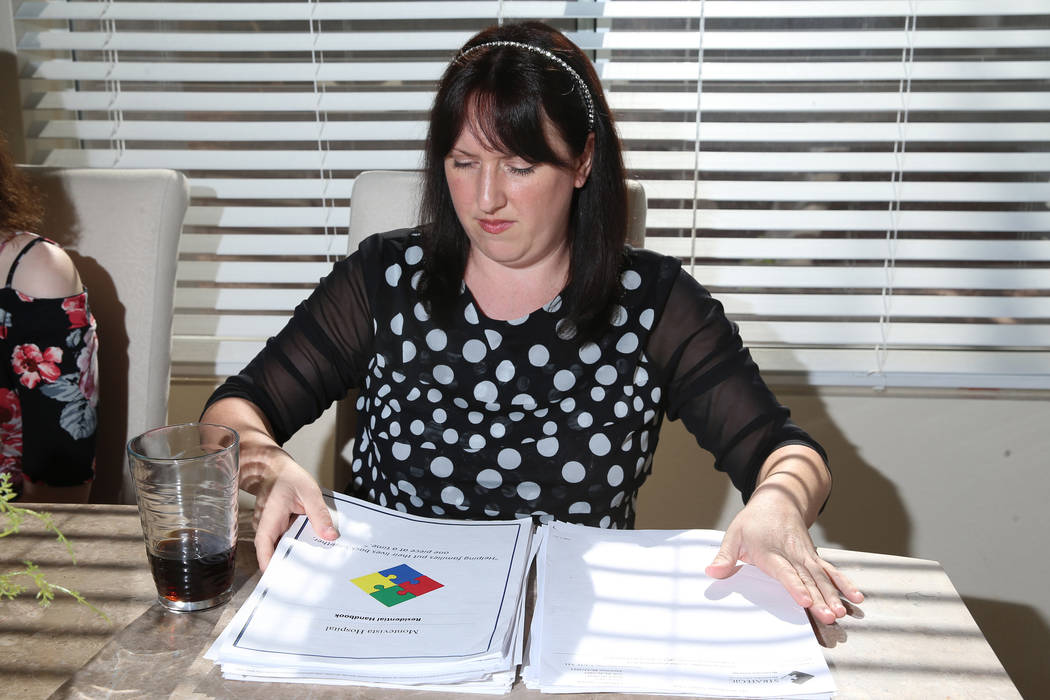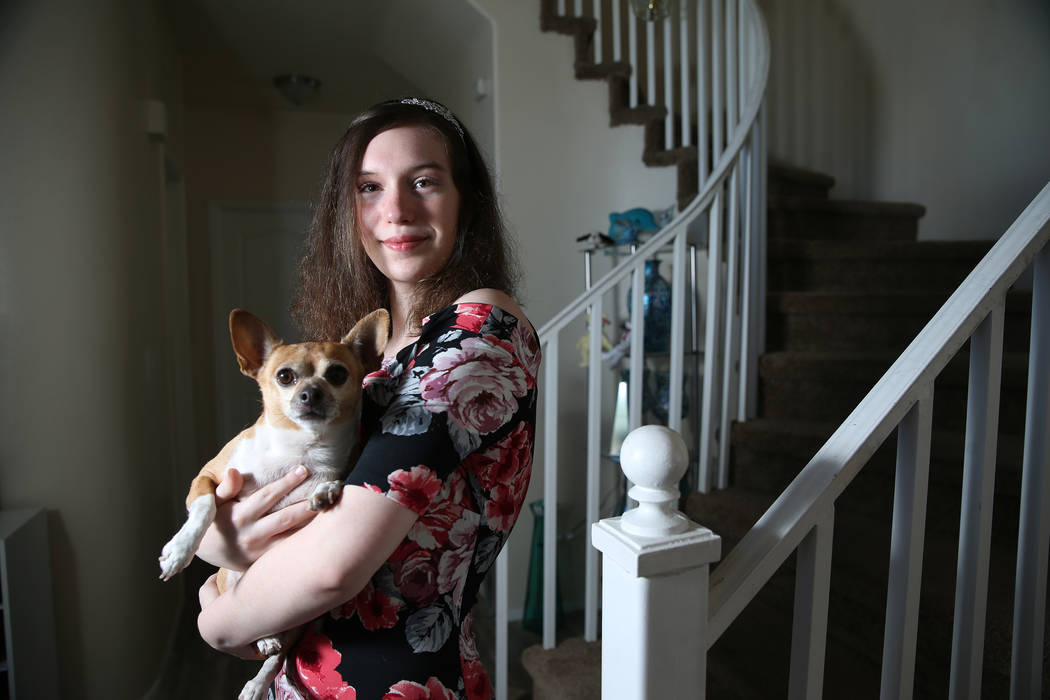Family describes dangers at Las Vegas psychiatric hospital
In many ways, Alyssa Canning is a typical teenager. The 16-year-old Las Vegas resident likes doing yoga, listening to music and playing with her Chihuahua, Lexy.
But her bipolar disease and depression can lead to impulsive actions such as hitchhiking and running away that disrupt normal life and put her in harm’s way, said her mother, Amanda Canning.
When Alyssa’s behavior became unmanageable last year, she entered the residential treatment program for adolescents at Montevista Hospital, which with 202 beds is the second-largest psychiatric hospital in Nevada. Among them are 92 beds for adolescents, the most of any facility in Southern Nevada.
During her hospitalization, Alyssa was attacked by another patient, who raked her fingernails across her cheek and neck, leaving deep scratches. Alyssa’s parents did not learn of her injuries until days later when patient families were allowed to visit.
“If anything happens to my daughter, I want to know about it,” Brian Canning said.
When the family complained, “the nurse downplayed my daughter’s injuries, saying they were minor,” Amanda Canning said. “They were not minor.”
Alyssa’s hospitalization in May and June coincided with a survey of the facility conducted by state and federal regulators in response to complaints.
The survey’s findings resulted in the Centers for Medicare and Medicaid Services (CMS) taking the extraordinary action in August of terminating its agreement with the hospital and cutting off Medicare and Medicaid reimbursements. In addition, the Nevada Department of Health and Human Services placed a temporary ban on new admissions to the hospital. That ban has since been lifted.
Regulators cited the hospital for “immediate jeopardy,” defined as noncompliance with government regulations that “has caused, or is likely to cause, serious injury, harm, impairment or death.”
‘Immediate jeopardy’
One “immediate jeopardy” situation identified by regulators involved patients intentionally setting off fire sprinklers and escaping from the facility. In one such case, Alyssa said she saw staff “forcibly taking down” another patient and hitting her head on a door, requiring the girl’s hospitalization at a medical facility. After the disturbance, Alyssa said a male staffer came into her room and bullied her.
Alyssa provided a statement to hospital administration about how the girl was injured. Her parents were told that staff would review video footage of the incident, but Amanda Canning said they never heard anything further.
“Nobody really cared,” Amanda Canning said. “That was the problem.”
Regulators documented two sprinkler incidents in June, including one in which a patient escaped and wasn’t found, according to survey documents.
Another “immediate jeopardy” situation identified by regulators involved patients “cheeking” or hiding their medication and giving it to other patients, a practice Alyssa said other patients spoke of.
Once identified, the safety threats posed by the hiding of medication and the setting-off of sprinklers were quickly abated, survey documents state.
Regulators also determined that the hospital had failed to comply with requirements related to patients’ rights, quality assessment and performance improvement, nursing services, medical record services and having an effective government body.
Amanda Canning, who works at a hospital and for two years worked as a mental health technician at a psychiatric facility, said that she observed a low ratio of staff to patients, a concern cited by regulators. She also heard “kids talking about constant codes (staff alerts) and fights daily.”
To avoid trouble, Alyssa said she tried to keep a low profile.
“It’s like high school — bad girls, good girls,” she said. “And some girls just stay to the side. I just stay(ed) to the side.”
But she still didn’t feel safe. After she was attacked, she was moved to the acute unit for her own safety until her parents took her home.
“I had to get my daughter out of there,” Amanda said. “It was too unsafe.”
Few options for care
But there are limited treatment options for teens like Alyssa, with only a few psychiatric hospitals in the state offering both acute and long-term residential services for adolescents.
Even before Montevista’s recent regulatory issues, there was a long waiting list at Desert Willow Treatment Center in Las Vegas, a state-run facility with 20 beds for adolescents, said Sheldon Jacobs, a licensed family and marriage therapist who advocates for additional local services.
Since she was first treated at age 5, Alyssa has been hospitalized another half dozen times.
When Southern Nevada treatment facilities were full, the family resorted to taking her to Northern Nevada for treatment on one occasion and to Utah on another.
The insurance copay for one hospitalization was $1,500, Amanda Canning said, adding. “It’s hard for normal working families to be able to afford it.”
What’s more, some families don’t have the resources to travel to and from an out-of-state facility to visit patients, said Jacobs, a board member for the Southern Nevada chapter of the National Alliance on Mental Illness. Kids also tend to do better closer to home and their support systems, he said.
A spokesman for CMS said the federal agency recognizes that local resources are scarce.
“We are working with the hospital in hopes of ensuring continued access to those services for the state’s adolescent population,” spokesman Jack Cheevers said in November.
The agency in October entered into a “systems improvement agreement” with Montevista requiring it to hire an independent quality improvement expert to perform a “root-cause analysis” of what caused the hospital to fall out of compliance with federal standards. It also is required to follow a corrective action plan, and its expert must provide periodic reports on the hospital’s progress to the federal agency.
At the conclusion of the yearlong agreement, CMS will conduct another survey of the hospital. “Montevista will be eligible for federal funding again if a certification survey finds it in full compliance,” Cheevers said.
CMS officials said Friday that the hospital had passed several early milestones in that process.
In a statement provided to the Review-Journal in 2019, Montevista said that it has made significant operational changes, including new processes and a new leadership team. The hospital declined to comment on the Cannings’ allegations.
Hope for improvement
The Cannings said they were speaking out about their own experience with the hope of inspiring change at the hospital and in the local mental health system.
“I just worry because I don’t want other kids to get hurt,” Alyssa said.
Amanda Canning said of her daughter, “I love her and I want to see her do good, and I haven’t had a lot of help.”
Months after she was attacked, Alyssa’s physical wounds have healed. She is doing very well at school, her mother said last week, with the assistance of a new therapist and, “after all these years of fighting for it,” curbside busing and aides at her high school.
As for Montevista, she said, “I’m glad that they have to comply and an order is in place for a year. But after the year, it will be concerning because they (facilities) tend to go back to old habits after not being closely monitored.
“We shall see,” she said.
Contact Mary Hynes at mhynes@reviewjournal.com or 702-383-0336. Follow @MaryHynes1 on Twitter.



